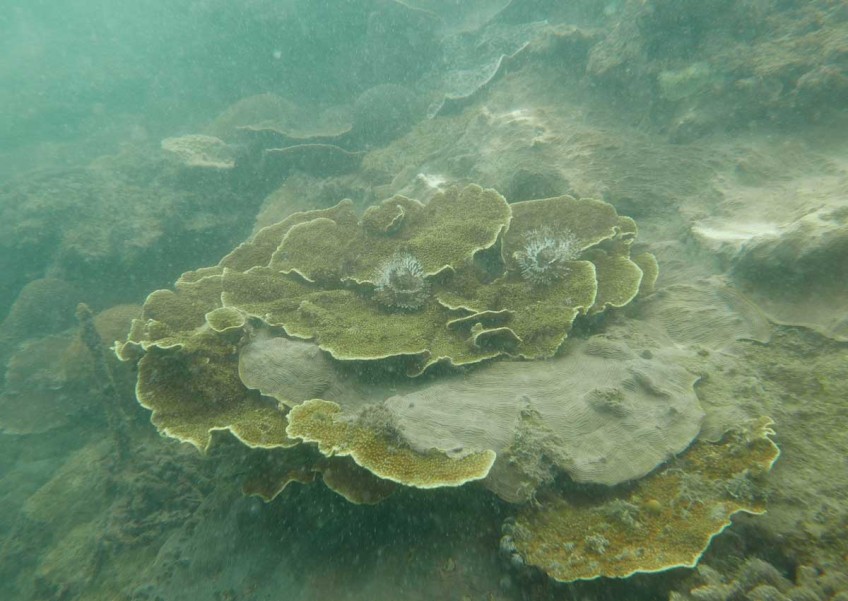Murky waters help save corals in the short term

Murky waters are the bane of scuba divers, but for corals, the sedimentation could be an unlikely ally in the struggle against warming seas.
A new study has found that murky waters could reduce the impact of sea temperature rises on corals - though only in the short term.
Corals depend on symbiotic algae called zooxanthellae to make food. Bleaching occurs when abnormally high sea temperatures cause corals to expel the zooxanthellae living in them, turning them white and causing them to lose a food source.
Sediment suspended in water helps to reduce the amount of solar irradiance - radiant energy per unit area - affecting the corals, said coral expert Chou Loke Ming, an adjunct research professor at the National University of Singapore's (NUS) Tropical Marine Science Institute, who was on the team that did the study.
"This helps to reduce sunlight energy through the water. Although the water temperature is elevated, the reduced sunlight energy helps to lower the impact," he said.
This could explain why corals growing in shallow areas here survived two major bleaching incidents in 1998 and 2010.
An analysis of corals at 15 sites over 27 years from 1986 - when Prof Chou's laboratory started quantitative reef monitoring - to 2012 showed that coral cover at depths of 3m to 4m could recover to the way they were within a decade.
At these shallow sites, coral cover over the years ranged between 25 per cent and 49 per cent, with the highest cover recorded when monitoring first started. The greatest decline occurred between 1988 and 1998 - due to the El Nino weather phenomenon that was linked to prolonged warm weather here.
But the corals recovered within the next decade. By 2008, mean coral cover had recovered to about 40 per cent, where they were in 1993, noted the study led by Dr James Guest, now a postdoctoral research fellow at the Hawaii Institute of Marine Biology.
Scientists from NUS and the National Parks Board (NParks) also contributed to the study, which was recently published in the journal Scientific Reports.
"The most interesting finding was that the shallow reefs appeared to recover well after major bleaching in 1998. This is all the more surprising when you consider how impacted Singapore's marine environment is," Dr Guest told The Straits Times.
However, Prof Chou warned that in the long run, murky waters could do the corals more harm than good.
"Overall, turbid waters interfere with the filter feeding of corals and reduce the sunlight energy required by the symbiotic algae. Over the long term, turbid waters can negatively affect the health of coral communities."
The picture of coral recovery at deeper sites of 6m to 7m was less rosy, with no recovery to historical levels observed. Overall, the 30 per cent coral cover decline at deeper sites was more than twice that of the 12 per cent decline at shallow sites.

Prof Chou said the sharper decline could be due to the presence of coral rubble, which accumulates at the bottom of a reef slope. "Even if coral larvae manage to settle on rubble pieces, they would not be able to survive because the rubble can turn over and bury larvae that settle on the surface."
The finding has implications on measures to safeguard corals during bleaching incidents, such as the one last year.
Moving corals to deeper waters was initially considered by NParks as a strategy to protect corals during bleaching, but NParks decided against doing so last year. Instead, it closed the dive trails at Sisters' Islands Marine Park, reopening them only last month, to allow more time for the corals to recover.
Dr Karenne Tun, director of the coastal and marine division at the NParks' National Biodiversity Centre, said: "The findings from this study add to our existing knowledge of spatial and temporal trends of Singapore's reefs over the past three decades."
Added Dr Tun, who was also part of the study: "It also reflects how proactive management measures, like reef restoration and species recovery programmes, can enhance reef recovery following stress events."

This article was first published on Jan 13, 2017.
Get a copy of The Straits Times or go to straitstimes.com for more stories.